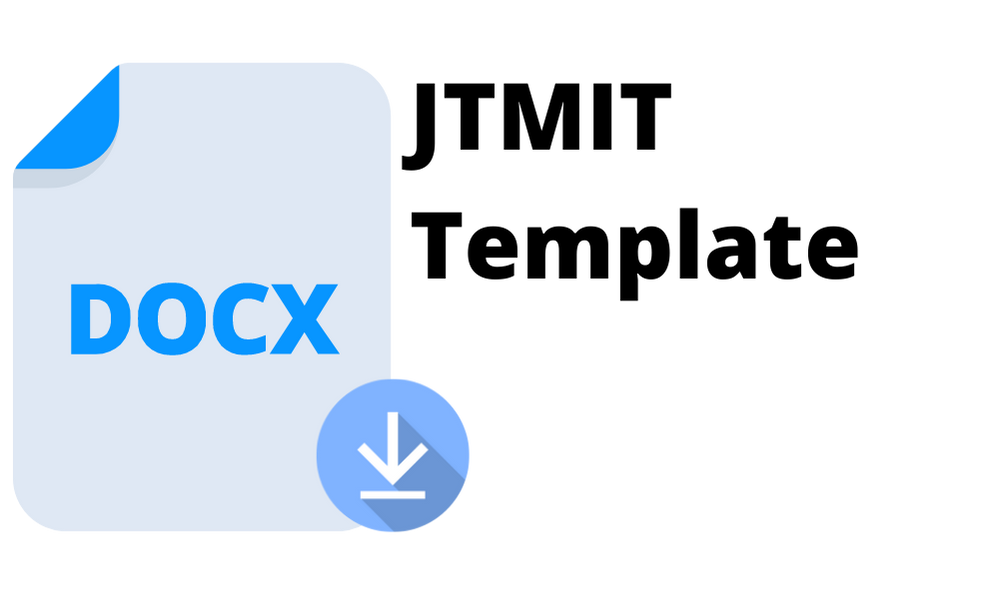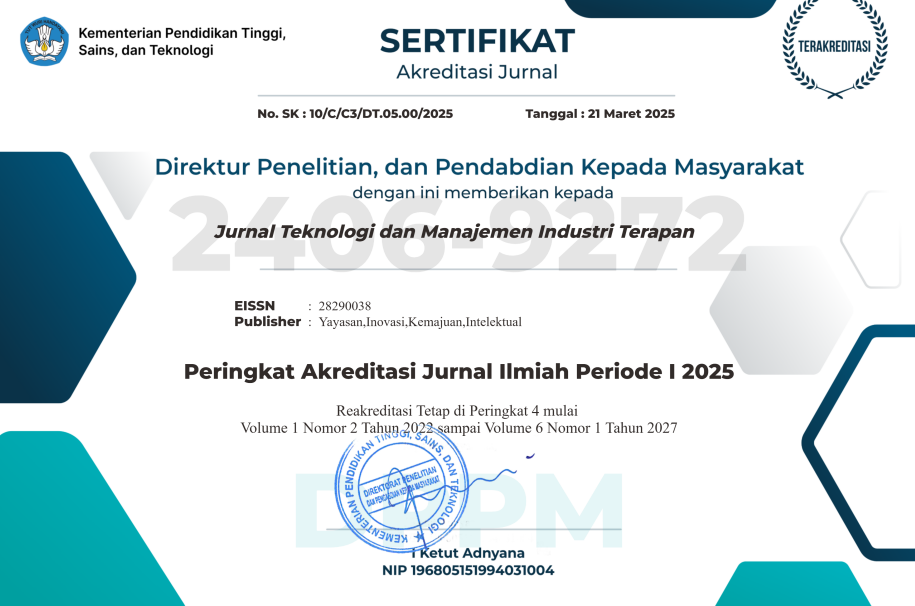The Influence of Digital Culture on Employee Performance with Work Discipline as a Moderating Variable
DOI:
https://doi.org/10.55826/jtmit.v4iI.1040Keywords:
Digital Culture, Employee Performance, Work DisciplineAbstract
This research is a quantitative research with an explanatory approach, which uses primary research to create hypotheses, test hypotheses, modify hypotheses, and prove the hypotheses that are built. The data used in this study is primary data that the researcher obtained from two hundred and eighty Bank Mandiri employees spread throughout Indonesia. The researcher obtained data from an online questionnaire containing ten questions about digital culture, employee performance, and work discipline. The data that the researcher obtained was analyzed using the smart PLS 4.0 analysis tool. The result of this article shows that the Digital Culture variable can have a positive relationship direction and a significant influence on employee performance. The P-values are positive and below the 0.05 significance level, namely 0.002. These results are in line with research. These results indicate that the better the Digital Culture, the easier it will be for employees to complete tasks and be more successful in completing targets. This, in turn, can improve Employee Performance. In the next row, the Work Discipline variable can moderate the influence of the Digital Culture variable on Employee Performance because the P-values also tend to be positive and below the 0.05 significance level, namely 0.000, smaller than direct testing. Thus, it can be concluded that this article's first and second hypotheses can be accepted and proven.
References
J. Buchanan, Digital Workplace and Culture: How Digital Technologies are Changing the Workforce and How Enterprise Can Adapt and Evolve. London: Deloitte Development LLC, 2016.
J. Buvat, The Digital Culture Challenge: Closing the Employee-Leadership Gap. Paris: Capgemini, 2017.
Microsoft, Digital Culture: Your Competitive Advantage. Irlandia: Microsoft, 2018.
H. S. Turkoglu, The Digital Cultural Identity on The Space Drawed in Virtual Games and Representative. Hershey: IGI Global, 2019.
S. Turkoglu, H. S., dan Turkoglu, “The Digital Cultural Identity on The Space Drawed in Virtual Games and Representative,” in Handbook of Research on Examining Cultural Policies Through Digital Communication, 2019, p. 143.
Kasmir, Manajemen Sumber Daya Manusia (Teori Dan Praktik). Jakarta: Raja Grafindo Persada, 2018.
E. R. Lestari and N. K. F. Ghaby, “The Influence of Organizational Citizenship Behavior (OCB) on Employee’s Job Satisfaction and Performance,” Ind. J. Teknol. dan Manaj. Agroindustri, vol. 7, no. 2, pp. 116–123, 2018, doi: 10.21776/ub.industria.2018.007.02.6.
M. Huda and F. Farhan, “Pengaruh Budaya Organisasional Dan Komitmen Organisasional,” J. Manaj. Motiv., vol. 15, no. 2, p. 62, 2019, doi: 10.29406/jmm.v15i2.1557.
M. Asdar, “Pengaruh Gaya Kepemimpinan Dan Lingkungan Kerja Terhadap Kepuasan Kerja Karyawan Pt. Pln (Persero) Rayon Watampone,” J. Ekon. Manaj. dan Akunt. STIE Wira Bhakti Makassar Int., vol. 8, no. 1, 2020, doi: 10.47151/jeaswb.v8i1.19.
H. Septianingsih, “Pengaruh green human resource management terhadap komitmen organisasional dan kinerja lingkungan pada pt pln (persero) unit induk wilayah sulselrabar,” 2022.
J. K. R. Rolos, S. A. P. Sambul, W. Rumawas, P. Studi, A. Bisnis, and J. I. Administrasi, “Pengaruh Beban Kerja Terhadap Kinerja Karyawan Pada PT. Asuransi Jiwasraya Cabang Manado Kota,” J. Adm. Bisnis, vol. 6, no. 4, pp. 19–27, 2018.
Nata, “Pengaruh Knowledge Management Terhadap Kinerja Karyawan: Studi Kasus Departemen Front Office Surabaya Plaza Hotel,” J. Manaj. Perhotelan, vol. 3, no. 1, pp. 1–9, 2013.
E. R. Putri et al., “Pengaruh Motivasi Dan Pengembangan Karir Terhadap Kinerja Keryawan Pada Bagian Mantri KSP. Bangun Jaya Di Bandung,” 2018. [Online]. Available: https://jurnal.narotama.ac.id/index.php/magistra/article/view/22
M. Y. Najib, “Pengaruh Beban Kerja dan Lingkungan Kerja Terhadap Kinerja Karyawan Dimediasi Oleh Kepuasan Kerja Pada UMKM Maju Makmur Pandaan Pasuruan,” UIN Maulana Malik Ibrahim Malang, 2016.
J. A. Jiputra, “PENGARUH GAYA KEPEMIMPINAN PARTISIPATIF, KEPUASAN KERJA DAN MOTIVASI KERJA, TERHADAP KINERJA KARYAWAN PADA DIVISI PENJUALAN PT REMBAKA,” Agora, vol. 7, no. 1, p. 22, 2019.
M. A. Aziz, “PENGARUH LINGKUNGAN KERJA DAN KINERJA KARYAWAN TERHADAP TURNOVER INTENTIONS DENGAN KEPUASAN KERJA SEBAGAI VARIABEL INTERVENING (Studi pada PT Selamat Lestari Mandiri Kota Sukabumi),” J. Apresiasi Ekon., vol. 9, no. 2, pp. 229–237, 2021, doi: 10.31846/jae.v9i2.383.
A. Rahmawati, “Pengaruh Budaya Digital Terhadap Kinerja Karyawan Di Yayasan Pendidikan Telkom (Studi Kasus Kantor Badan Pelaksana Kegiatan Ypt),” J. Manag. Bus. Rev., vol. 16, no. 2, pp. 129–148, 2020, doi: 10.34149/jmbr.v16i2.153.
R. C. Suparman and E. Sugiyanto, “Pengaruh Budaya Digital dan Disiplin Kerja Terhadap Kinerja Pegawai di Masa WFH di Ditjen Dukcapil Tahun 2020-2021,” Popul. J. Sos. dan Hum., vol. 7, no. 2, pp. 244–260, 2022, doi: 10.47313/pjsh.v7i2.1967.
Ardansyah, “Pengawasan, Disiplin Kerja, dan Kinerja Pegawai Badan Pusat Statistik Kabupaten Lampung Tengah,” J. Manag. Enterpreneursh., vol. 16, no. 2, pp. 153–162, 2014.
Dodi, “Pengaruh Iklim Organisasi, Etos Kerja dan Disiplin terhadap Kinerja Karyawan serta Dampaknya pada Kinerja PT. Arun NGL Lhokseumawe Aceh,” J. Manaj., vol. 02, no. 01, pp. 98–107, 2013.
I. Kurniawan and I. Ali Alam, “Pengaruh Etos Kerja Dan Disiplin Kerja Terhadap Kinerja Pegawai Kantor Otoritas Jasa Keuangan Provinsi Lampung Di Masa Pandemi Covid-19,” SIBATIK J. J. Ilm. Bid. Sos. Ekon. Budaya, Teknol. dan Pendidik., vol. 1, no. 6, pp. 987–992, 2022, doi: 10.54443/sibatik.v1i6.116.
A. Saputra, S. Rahayu, and C. Choiriyah, “Pengaruh Disiplin Kerja, Kompetensi dan Motivasi Terhadap Kinerja Pegawai Badan Penanggulangan Bencana Daerah Provinsi Sumatera Selatan,” J. Bisnis, Manajemen, dan Ekon., vol. 4, no. 1, pp. 1–12, 2023, doi: 10.47747/jbme.v4i1.900.
M. Sarstedt, C. M. Ringle, D. Smith, R. Reams, and J. F. Hair Jr, “Partial least squares structural equation modeling (PLS-SEM): A useful tool for family business researchers,” J. Fam. Bus. Strateg., vol. 5, no. 1, pp. 105–115, Mar. 2014.
Hair, Multivariate Data analysis, Seventh Editions. Prentice Hall: New Jersey, 2010.
I. Ghozali, Aplikasi analisis multivariete dengan program (IBM. SPSS). Diponergoro: Univrsitas Dipenogoro, 2016.
Downloads
Published
Issue
Section
License
Copyright (c) 2025 Hertya Andriani, Desi Ulpa Anggraini, Ishak, Mohamad Yusuf Golam, Sian Linda Lerebulan

This work is licensed under a Creative Commons Attribution-NonCommercial-ShareAlike 4.0 International License.


















